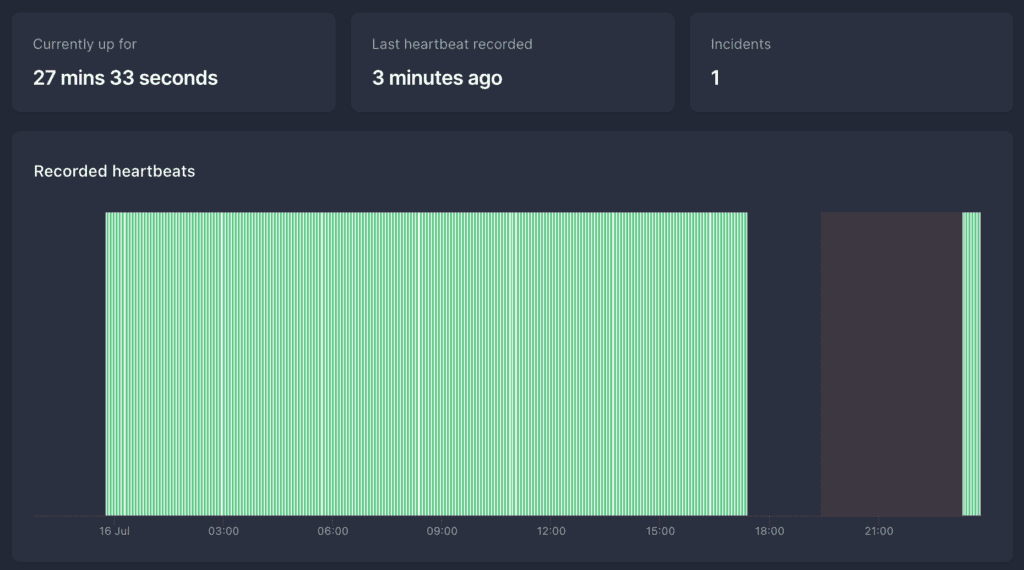Content Update
The provided scripts have been updated on 16 Jul 2023. Specifically the SmartStrip part was not working as intended.
I’ve been a big fan of Betteruptime. I’ve started using it to monitor all my assets online (websites, DNS, ping, successful script runs) as well as my servers (using heartbeats).

I have a few Raspberry Pi’s, and once in a while they hang (not sure why, maybe USB-to-SSD issues or something). Nothing too critical, but annoying.
I’ve plugged them all on TP-Link Kasa smart plugs to remotely restart them if I had to (once or twice a year).
Note, to confuse everyone, TP-Link also launched Tapo, which... competes with Kasa and is not compatible, but does the exact same thing... ¯\_(ツ)_/¯
After some Googling (actually Kagi’ing) I found out, there’s a Python library that lets you control your smart plugs.
So, the idea was born to:
- Check Betteruptime heartbeats, if down, power cycle the smart plug
- Do this at most once per day (in case something else is causing issues)
- Betteruptime heartbeats manage when a device is marked as offline (i.e.: it expects a heartbeat every 5 minutes, but will only consider the device down if no heartbeats are received for 2 hours).
- The bulk of the code had to be written by ChatGPT. Let ChatGPT choose the language (it ended up being a mix of Bash and Python)
- Everything needs to run in Docker (using a cron, the Docker container doesn’t daemonise)
- These run on Raspberry Pi’s (but of course the RPi can’t check itself: so RPi1 checks for RPi2, and vice versa. As these RPis are on different networks (my parent’s home, my own home, etc) I had to enable “
--net=host” inDocker runto get the correct routes from the host system, but you may not actually need this - To top if off, sent an email (using Mailgun EU servers) to warn me something broke and it rebooted
So, after some fiddling (half an evening or so) the proof-of-concept worked.
I should probably throw this in a Git repo but shrug. I don’t want to give the impression that I’ll maintain this and provide support.
Dockerfile:
FROM python:alpine
RUN apk add bash curl jq
RUN pip3 install python-kasa
COPY heartbeat.sh kasa-api.py /
VOLUME /tmp/kasa/
CMD ["/heartbeat.sh"]Python script kasa-api.py (this works with both smart strips and smart plugs):
import sys
import asyncio
from kasa import SmartPlug, SmartStrip
async def main():
if len(sys.argv) != 4:
print("Usage: python kasa-api.py type IP-address outlet-index")
return
device_type = sys.argv[1]
ip_address = sys.argv[2]
outlet_index = int(sys.argv[3])
if device_type == "smartplug":
await control_smart_plug(ip_address)
elif device_type == "smartstrip":
await control_smart_strip(ip_address, outlet_index)
else:
print(f"Unsupported device type: {device_type}")
async def control_smart_plug(ip_address):
plug = SmartPlug(ip_address)
try:
await plug.update()
# Retrieve the current state
plug_state = plug.is_on
# Turn off the plug
await plug.turn_off()
print(f"Turned off SmartPlug at {ip_address}")
await asyncio.sleep(5)
# Turn on the plug if it was previously on
if plug_state:
await plug.turn_on()
print(f"Turned on SmartPlug at {ip_address}")
except Exception as e:
print(f"Failed to control SmartPlug at {ip_address}: {e}")
async def control_smart_strip(ip_address, outlet_index):
strip = SmartStrip(ip_address)
try:
await strip.update()
# Retrieve the current state of the specified child plug
child_state = strip.children[outlet_index].is_on
# Turn off the specified child plug
await strip.children[outlet_index].turn_off()
print(f"Turned off child plug {outlet_index} in SmartStrip at {ip_address}")
await asyncio.sleep(5)
# Turn on the child plug if it was previously on
await strip.children[outlet_index].turn_on()
print(f"Turned on child plug {outlet_index} in SmartStrip at {ip_address}")
except Exception as e:
print(f"Failed to control SmartStrip at {ip_address}: {e}")
# Run the asyncio event loop
asyncio.run(main())heartbeat.sh — with example devices. Be sure to fill in the variables (including hb, that’s the heartbeat ID you can get from the Betteruptime URL and the IP or DNS hostname of the smartplug):
#!/bin/bash
API_KEY="BetterUptime API token"
BU="https://uptime.betterstack.com/api/v2/heartbeats/" # no need to change this
MAILGUN_API_KEY="Mailgun API token"
MAILGUN_DOMAIN="mg.you.com" # use your own domain
if [[ "$DEVICE" = tyr ]] || [[ "$1" = tyr ]]; then
# Tyr
device="Tyr"
hb=1111
bu="https://uptime.betterstack.com/team/1/heartbeats/$hb"
plug_type="smartplug"
plug_host="smartplug1.kasa.you.com"
elif [[ "$DEVICE" = mammoth ]] || [[ "$1" = mammoth ]]; then
# Mammoth
device="mammoth"
hb=2222
bu="https://uptime.betterstack.com/team/1/heartbeats/$hb"
plug_type="smartstrip"
plug_host="smartstrip1.kasa.you.com"
plug_index=0 # plug 2 is rly plug 3 because the index counts from 0 to 2 and not from 1 to 3.
elif [[ "$DEVICE" = liana ]] || [[ "$1" = liana ]]; then
# Liana
device="liana"
hb=3333
bu="https://uptime.betterstack.com/team/1/heartbeats/$hb"
plug_type="smartstrip"
plug_host="smartstrip1.kasa.you.com"
plug_index=1 # plug 2 is rly plug 3 because the index counts from 0 to 2 and not from 1 to 3.
elif [[ "$DEVICE" = eagle ]] || [[ "$1" = eagle ]]; then
device="eagle"
hb=4444
bu="https://uptime.betterstack.com/team/1/heartbeats/$hb"
plug_type="smartstrip"
plug_host="smartstrip1.kasa.yeri.be"
plug_index=2 # plug 2 is rly plug 3 because the index counts from 0 to 2 and not from 1 to 3.
else
echo "Unknown device."
exit 1
fi
url=$BU/$hb
send_alert() {
MAILGUN_URL="https://api.eu.mailgun.net/v3/$MAILGUN_DOMAIN/messages"
from="[email protected]"
to="[email protected]"
subject="Smartplug power cycled: $device"
body="rebooted device $device!"$'\n'"Kasa IP: $plug_host."$'\n'"$bu"
# Send alert email
curl -s --user "api:$MAILGUN_API_KEY" \
"$MAILGUN_URL" \
-F from="$from" \
-F to="$to" \
-F subject="$subject" \
-F text="$body"
}
kasa_cycle() {
echo "Betteruptime heartbeat ($hb) says the service for $device is down, restarting."
python /kasa-api.py "$plug_type" "$plug_host" "$plug_index"
# Update the last execution date in the file
echo "$current_date" > "$file"
}
kasa_info() {
kasa --host $plug_host
}
response=$(curl -sL "$url" -H "Authorization: Bearer $API_KEY")
status=$(echo "$response" | jq -r '.data.attributes.status')
if [[ "$status" == "down" ]]; then
dir="/tmp/.kasa/"
mkdir -p "$dir"
file="${dir}${device}.txt"
# Get current date
current_date=$(date "+%F")
# Check if the file exists
if [ -f "$file" ]; then
# Get last execution date from the file
last_execution=$(cat "$file")
# We only want to run this once every 24hrs. If a reboot doesn't fix it, something more
# serious is going on and likely needs manual intervention. No point spam rebooting the device.
if [[ "$current_date" != "$last_execution" ]]; then
kasa_cycle
send_alert
else
echo "Power cycle already executed today."
fi
else
kasa_cycle
send_alert
fi
elif [[ "$status" == "up" ]]; then
echo "Betteruptime heartbeat says the service ($hb) for $device is up."
else
# this could happen if the heartbeat is paused.
echo "Unknown status."
kasa_info
exit 1
fiI run Docker with two scripts, a builder (rebuild.sh) and a file that runs it (start.sh). It should rebuild in case a docker cleanup script ran (and deleted dangling containers).
I run this as root and probably shouldn’t, but yeah… That’ll be for another lifetime.
Be sure to change the paths (/root/git/kasa-api) in both scripts.
rebuild.sh:
#!/bin/bash
cd /root/git/kasa-api # the path where this project exists
git pull > /dev/null
BASEIMAGE=`cat Dockerfile | grep FROM | awk '{print $2}'`
docker pull $BASEIMAGE
docker build -q -t kasa-api .
rm -f /tmp/.kasa/*.txtstart.sh:
#!/bin/bash
if [ -z "$1" ]; then
echo "Missing device name."
exit 1
fi
docker stop kasa-api 2> /dev/null
docker rm kasa-api 2> /dev/null
run_kasa() {
DEVICE=$1
docker run --net=host -v /tmp/.kasa:/tmp/.kasa --rm -e DEVICE=$DEVICE --name kasa-api kasa-api
}
if [[ $(docker image ls | grep kasa-api) ]]; then
run_kasa $1
else
cd /root/git/kasa-api
/root/git/kasa-api/rebuild.sh > /dev/null
run_kasa $1
fiAnd that’s pretty much it. I run this using with cron in /etc/cron.d/. For example (be sure to edit the parameter/device name/path):
#
# cron-jobs for kasa-api
#
MAILTO=root
*/15 * * * * root if [ -x /root/git/kasa-api/start.sh ] && [ -f /root/git/kasa-api/start.sh ]; then /root/git/kasa-api/start.sh tyr >/dev/null; fiI’m sure there must be bugs in this ChatGPT generated code but… so far, it has actually worked.

Leave a Reply…